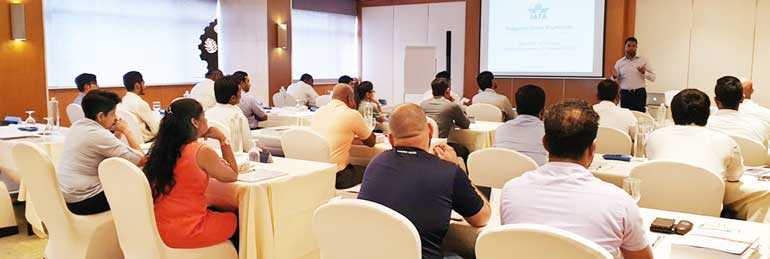Sunday Feb 15, 2026
Sunday Feb 15, 2026
Monday, 9 December 2019 00:50 - - {{hitsCtrl.values.hits}}



Sri Lanka Logistics and Freight Forwarders Association (SLFFA), the apex body representing the freight forwarding industry in Sri Lanka, conducted the Dangerous Goods Regulations training program for its members in November at Hilton Colombo Residences. 24 participants from member companies attended the initial course and 47 attended the refresher course.
The IATA Dangerous Goods Regulations (DGR) is the trusted source to help you prepare, handle or accept dangerous goods shipments by air. Recognised by the global airline industry for over 60 years, the DGR is the most complete, up-to-date, and user-friendly reference enabling companies to ensure their shipments are compliant with the latest regulations. All parties involved in the shipment of dangerous goods by air can benefit from using the DGR including airlines, freight forwarders, ground handlers, manufacturers, and shippers.
SLFFA launched an international class training academy in November 2006. Fully endorsed and supported by its members and all sectors of trade and industry connected to international trade and transportation, it has been named as The Academy of International Trade and Transport (AITT).
AITT is the training arm of SLFFA and endorsed by the United Nations Economic and Social Commission for Asia and the Pacific (UNESCAP), the International Federation of Freight Forwarders Associations (FIATA) and an Accredited Training School (ATS) of International Air Transport Association (IATA). It is also a training institute approved by the Directorate of Merchant Shipping, Ministry of Ports and Aviation.
Today, globalisation has been the most prominent factor driving the increase in the number of companies in the global market place. This necessitates a broader perspective than when operating as an international company, which may include, amongst others, attributes such global branding, global sourcing, global production, centralisation of inventories and centralisation of information. All of these aspects serve to emphasise the added difficulty of operating effectively in a global environment. Logistics and supply-chain networks have become far more complicated, and meeting the need to plan and manage logistics as a complete and integrated system has become far more difficult. Because of this, the best solution for a global company is very often to outsource its logistics operations.
Therefore, training and developing the knowledge and skills in our human resources, by adding another career opportunity to the job market, in the logistics and supply chain management field is a need of the hour and should receive national level priority from Government and Merchant sectors of the economy.